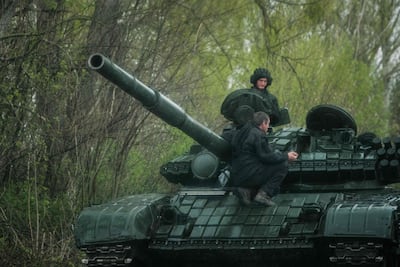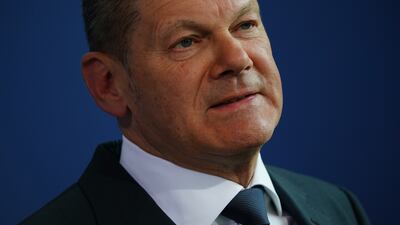Tensions in Germany’s coalition government caused by Chancellor Olaf Scholz’s reluctance to send heavy weapons to Ukraine threaten to reach breaking point this week in a parliamentary vote.
Friedrich Merz, the Christian Democratic Union (CDU) opposition leader, said he plans to force a vote on a motion calling for “immediate” deliveries of heavy weapons, including tanks.
Junior coalition partners are expected to oppose Mr Scholz.
Mr Merz described how “an open dispute is raging in the federal government” and accused Mr Scholz of failing to come clean on his position.
“He covers up, he keeps silent, he only tells half the truth,” Mr Merz said. “Criticism abroad is growing, and Germany is increasingly isolated.”
Saskia Esken, the co-leader of Scholz's Social Democrats (SDP), addressed the divisions on Monday by calling on former chancellor Gerhard Schroder to quit the party because of his ties to Russian President Vladimir Putin.
She said it was time to stop looking at Mr Schroder as a former chancellor and see him as a businessman.
“We called on Gerhard Schroder to step down from Russian companies,” she said on DLF public radio on Monday.
“Sadly, he didn't follow that advice. Schroder has worked for years as a businessman, and we should stop seeing him as an elder statesman, as a former chancellor,” she said, adding that he should quit the party.

On February 27, three days after Russia invaded Ukraine, Mr Scholz bowed to domestic and international pressure and announced a departure from defence policy and supply arms to Ukraine.
But he has since shown little appetite to follow through on his pledge.
Batches of arms shipped from Germany, with Europe’s largest economy, have been smaller than packages sent by smaller Nato allies such as Estonia and the Czech Republic.
Among the Nato and G7 members Germany has, since the beginning of the invasion, stood out for its reluctance to supply Ukraine with arms.
Mr Scholz’s government has repeatedly delayed sending heavy weapons, such as Marder armoured personnel carriers, to Ukraine.
The government has put forward reasons for ministers’ reluctance, saying it would take too long to train Ukrainians in the use of western weapons and it was trying to avert a nuclear war.
Ukraine rejected the claim that Nato equipment would be useless because its troops would need months of training in how to use it.
Senior sources in junior coalition partners the Greens and the Free Democrats have called on Mr Scholz to rethink his views.
The Greens’ Annalena Baerbock, Germany's Foreign Minister, has said: “Ukraine needs heavy weapons”.
However, she said that vehicles like Leopard tanks and the Marder “just don’t work from scratch”.
Speaking during a visit to Tallinn, Estonia, last week, Mr Baerbock said Germany was willing to pay for the training but that countries in the former Soviet sphere of influence were better placed to deliver weapons from their own inventories right now.
A spokesman for the government said on Monday said that Germany will soon decide on whether to approve the delivery of 100 old Marder infantry fighting vehicles to Ukraine. If approved, it would be the first German heavy weapons shipment to Kyiv.
German defence company Rheinmetall has requested approval to export the vehicles to Ukraine, a source told Reuters on Monday, planning to restore them before shipping.
The firm’s move could force Mr Scholz to take a clear position on whether heavy weapons can be sent directly from Germany to Ukraine because the Marder deal requires approval from the national security council, which is chaired by the chancellor.
His reluctance risks undermining Germany’s image as a reliable ally, according to Anton Hofreiter, a veteran Green MP who chairs parliament’s Europe committee.
“The problem is in the chancellery,” Mr Hofreiter told RTL television last week. “We must now finally begin supplying Ukraine with what it needs — and that includes heavy weapons.”




















































